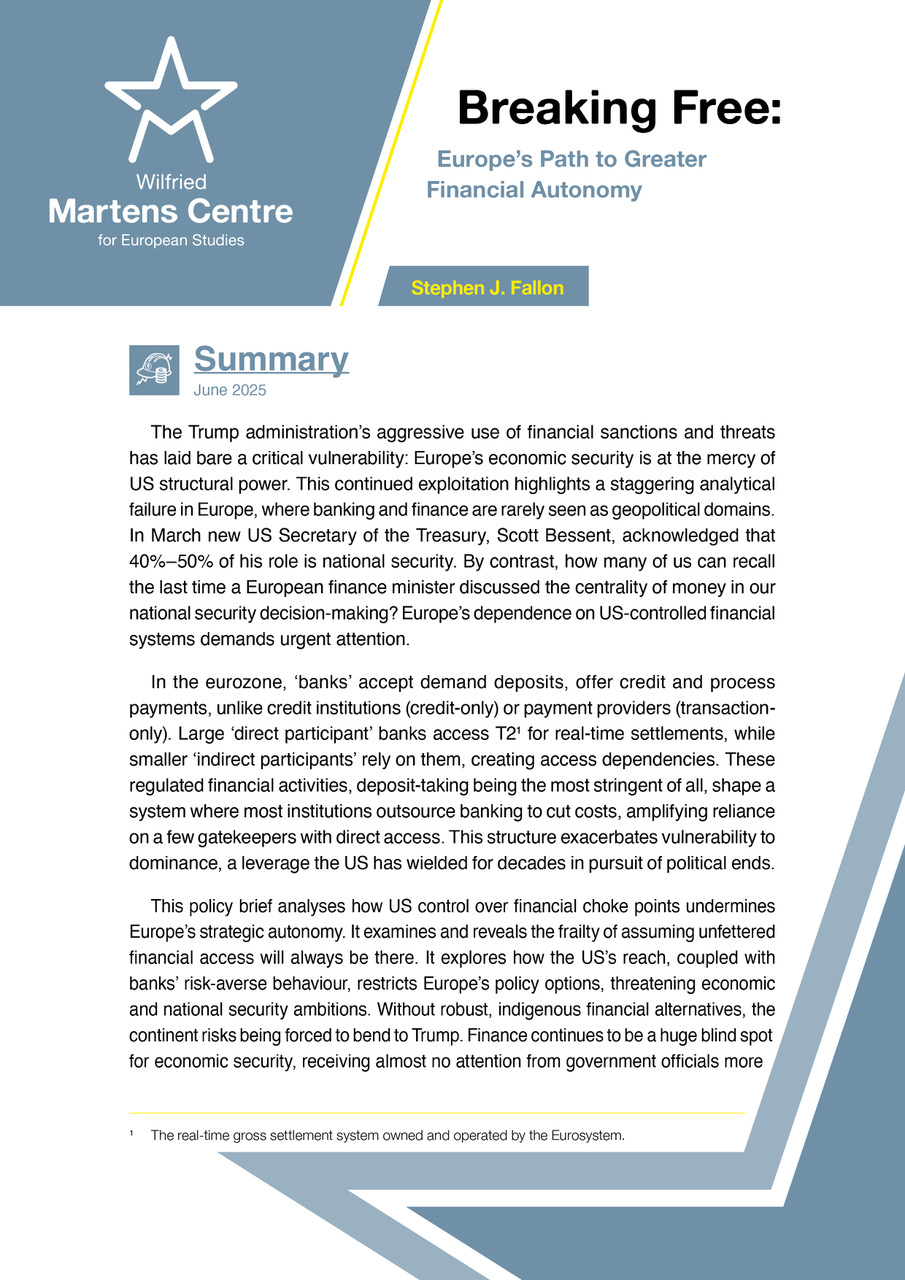It’s the Economy or Bust for Europe’s Centre Right in 2025
07 January 2025

The economic narrative surrounding the European Union (EU) in 2024 was dominated by the publication of the Draghi and (to a lesser extent) the Letta reports.
Both laid bare the challenges facing the EU in a more competitive global economy. Draghi and Letta – directly and indirectly – identified the lack of political action in implementing structural reforms as integral to Europe’s declining global competitiveness.
In many respects the recommendations of these reports were both obvious (more investment!) and based on policies that have been kicked around the Schuman roundabout longer than its ongoing redevelopment (Capital Markets Union!).
Remarkably, it’s like Brussels forgot the quarter of a century since the Lisbon Strategy and Europe’s last great push for growth and jobs.
And therein lies the problem of EU economic policy.
Because long before the pandemic and Russia’s invasion of Ukraine, the economic essentials which drive Europe’s wealth creation were ignored by Brussels-based policymakers. The objectives of deepening the Single Market, completing the Eurozone’s (unfinished) architecture and ensuring Europe is a profitable place to do business were sidelined.
These “boring” topics were replaced by a vision of the EU as a geopolitical actor. A unified world player funding everything from a green-rush transition, pan-European pandemic support, Ukraine and a myriad of other geopolitical “actions”.
A steady stream of constant communication to service Brussels’ expanding communications game.
After all, the Single Market isn’t exactly clickbait compared to visions of global relevance.
And while many of these ambitions remain laudable, the fact is that Europe’s economy is no longer generating the economic growth sufficient to deliver these policies. Joint borrowing is a recipe for further fragmentation without the structural reforms necessary to deliver (not promise!) increased economic growth. Worse still, the avalanche of regulations and directives from Brussels has strangled the growth prospects of European companies.
Large or small, exporting or selling locally – European firms are struggling to invest, expand and grow.
Yet, still, the EU doesn’t full grasp the economic realities. And unfortunately, the examples are almost endless.
Imposing billion of euros (in fines) on EU carmakers for not meeting EU environmental rules is not based on economic realism, nor any rational cost benefit analysis. It’s more centralised state planning than social market economy. Rather, it just makes European companies more vulnerable to Chinese and US competitors while simultaneously costing jobs across the EU.
France – whose inability to observe Eurozone financial rules was long ignored by the European Commission – is now stuck in a high debt, low growth cycle with no politically plausible strategy for reducing its budget deficit. Ironically, only Draghi’s 2012 pledge for the ECB to do “whatever it takes” has prevented France’s financial crisis from spreading to a much more serious European one.
But, that’s not a long term strategy. And for Europe’s centre right the danger signs are everywhere.
Dominating the European Parliament, the College of Commissioners and holding the Presidencies of the Commission and Parliament infers a pressure to deliver.
The warnings have already been delivered. The European Elections of 2024 witnessed a significant increase in parliamentary representation in those hostile to the wider European integration process. In the United States, the detachment of the Democratic Party from its working class (and minority) roots resulted in the return of President Trump and his unique blend of pseudo-conservative populism. His success has further strengthened anti-EU forces across Europe.
The reality is that when families are struggling to pay the bills, to buy or rent a decent place to live and finding their wages always lagging inflation – then the broader environmental or cultural wars just have to wait.
Economics trumps ideology. Every single time.
So what strategy should the centre right seek to own?
Very simply – the return of meaningful economic growth and rising real wages should be the dominant objective.
But to achieve this requires – in many sectors – the EU to do considerably less, not more.
Rules and laws must be simplified. The Single Market must be prioritised and the Eurozone’s architecture strengthened. The EU must enforce its fiscal rules without favour, no matter the size or scale of the member state involved.
But the reality is that the prospects are only mixed at best.
Brussels’ dreams of a Capital Markets Union are stuck facing the reality of entrenched national interests in Berlin and other capitals. Yet here the possibility of real change approaches. A new centre-right-led German government must support the easier movement of capital around the Single Market as an essential element of economy recovery. A Europe that only grows in the North and East will never be a real global player, nor a particularly wealthy one.
The next one hundred days will set the tone for the next four years.
Because, this time, it really is the economy or bust for Europe’s centre right.
ENJOYING THIS CONTENT?




















